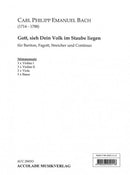| 作曲者 | Carl Philipp Emanuel Bach (1714-1788)・カール・フィリップ・エマニュエル・バッハ |
| タイトル | Gott, sieh dein Volk im Staube liegen (Orchestral material) |
| サブタイトル | Arie des Moses aus dem Oratorium "Die Israeliten in der Wüste" |
| 出版社 | Accolade Musikverlag |
| 楽器編成 | singers (baritone), bassoon and strings |
| 品番 | mds9790503052118 |
| 校訂者 | Bodo Koenigsbeck |
| 難易度 | advanced |
| 演奏時間 | 6分20秒 |
| 出版番号 | ACC 2043O |
| ISMN | 979-0-50305-211-8 |
| その他 | Orchester parts |
The "Israelites" is a work of the sensitive style. The choice of subject matter and treatment of the text already reflect this musical ideal. The Hamburg poet Daniel Schiebeler, author of other oratorio and song texts, refrains from direct quotations from the Bible and instead uses poetic reflections on excerpts from the Old Testament, which deal with the passage of the thirsty and discouraged Jews through the desert. It is only when Moses points to the life-giving spring of water that the people regain their faith and praise God.
In the instrumental introduction, Bach creates a tense crescendo in just a few bars. There is a tone-painting symbolism here, similar to the idea of chaos at the beginning of Joseph Haydn's oratorio Die Schöpfung.
Probably the most beautiful aria in the oratorio is that of Moses: God, see your people lying in the dust. In a calmly flowing cantilena, the solo bassoon and singer enter into an expressive dialogue without any coloratura.



